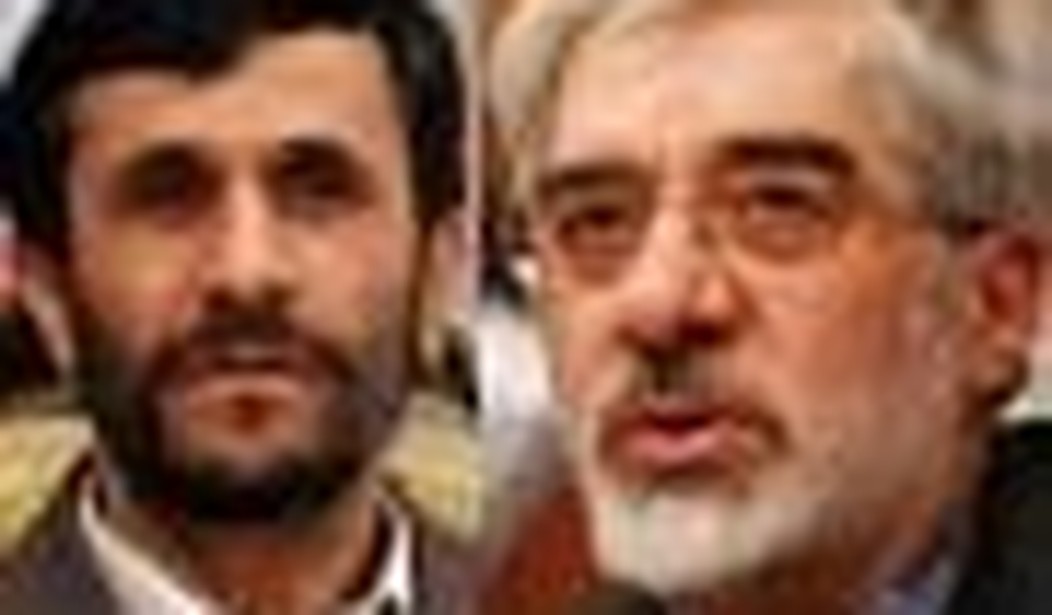On June 12, the Iranian presidential election will be held. Despite the hopes and dreams of those believing that the tension with Iran relies upon the status of Ahmadinejad and not the regime as a whole, this election isn’t a referendum on whether to become a friend of the U.S.; nor is it a campaign about whether to eliminate the position of supreme leader, the head mullah who controls all the meaningful levers of power and is the true guiding force behind the regime’s actions and ideology. This is a debate about how best to prolong the life of the regime — whether to take a more Stalinist approach to the rising popular discontent or to engage in limited liberalization and tactical shifts in rhetoric and policy to solicit Western investment and appease the anti-mullah population.
Western observers need to remember that Ayatollah Khamenei and the mullahs of the Guardian Council decide who can run in the elections and therefore that no genuinely liberal candidate can emerge. To give you an idea of the high standards to which the mullahs’ hold the prospective candidates, consider that only four of about 475 people who sought to run for president were approved. It’s tempting to paint this as a clash between the anti-American conservatives, President Ahmadinejad and Mohsen Rezai — a former Revolutionary Guards commander thought to be involved in a 1994 bombing in Argentina and who likes to present himself as the more sensible hardliner — and the pro-West “liberal reformers” of Mir Hossein Mousavi, a former prime minister, and Mehdi Karoubi, a former speaker of parliament. However, such thinking fails to account for the political structure of the regime or the great deception Khamenei may be planning by creating (or allowing) a victory by a candidate more appealing to the West.
The truth is that neither Mousavi nor Karoubi can be expected to change the threat Iran poses in any meaningful way. Karoubi, while criticizing the power the Guardian Council has over the election process, has publicly stated that should he become president, he’d continue Iranian sponsorship of Hamas. Mousavi, though he has called for complete women’s rights and other positive reforms, was a staunch supporter of Ayatollah Khomeini and was a fiend to his liberal opponents when he was the editor-in-chief of the regime’s official “newspaper” after the Islamic Revolution. Mousavi’s appearances are often met with protests from Iranian students and political activists seeking answers about his alleged role in authorizing the execution of some 30,000 political opponents in 1988.
The general wisdom is that the June 12 election will result in a run-off between Mousavi and Ahmadinejad on June 19. The Iranian population would much rather have Mousavi win, but huge numbers boycotted the previous elections and will boycott these as a form of silent protest. As it is impossible to estimate how many Iranians will vote for moderate change out of desperation and how many will stay home, it’s unwise to make any firm predictions on whom voters will choose.
The ability of the supreme leader and his loyalists to engage in enough fraud to manipulate the outcome further renders such predictions pointless. An abundant amount of evidence exists to suggest that elements of the regime rigged the polls in 2005 in Ahmadinejad’s favor, as the other candidates in that contest including Karoubi asserted. As Ayatollah Khamenei has come just shy of an open endorsement of Ahmadinejad, telling voters not to vote for candidates who would bow to the West, it is reasonable to assume that similar manipulations with a similar outcome will happen this time.
Khamenei and his operatives now have a choice to make, one that will shape relations with the West for the next four years and could decide the fate of their own power. The option Khamenei appears on the surface to have taken is to keep Ahmadinejad in power, hoping to keep Iran in a state of hostility with the West in an attempt to use nationalism to put juice in the regime’s dying batteries. This approach would also require the further curbing of freedom and a more violent approach to the protests and fomenters of instability throughout the country, who are becoming louder every day and almost certainly will overthrow the regime absent Tiananmen Square-like measures. The mullahs will have to gamble that such measures will squash the determination of the opposition for the time being without provoking an even worse popular backlash that causes the government’s institutions to collapse.
The other option is to allow a candidate like Mousavi to come to power that can introduce reforms that impress the West and appease the population. The hope would be that this candidate could act as a modern-day Gorbachev, only without the whole collapse of the Soviet Union thing. The Iranians, with a more articulate and pleasant-sounding leader, could fracture any coalition seeking to place pressure on the regime and may even be able to convince the West to relax sanctions and provide them with the investment needed for their survival. The infusion of money would allow the regime to recover its lost wealth, and with economic conditions improving, the mullahs would hope that the population’s resistance would reduce to a level that doesn’t threaten the stability of the country.
This, too, is a gamble, as any increased interaction and business with the West by the population could further motivate and even empower the opposition, and such a change in foreign policy could spark sharp divisions in the government. Liberal political reforms are also risky, as they may give the opposition a louder voice, more freedom to organize, and a feeling of victory and hope that could energize the movement in extraordinary ways. The regime must hope that their increased power is not outpaced by the opposition.
Should Mousavi become Iran’s next president, it will be an admission by Khamenei that his regime needs the West to save it. They shouldn’t and support for the opposition has a place in whichever policy towards Iran the U.S. enacts in reaction to the election results, whether that is engagement and reward or isolation and punishment. Regardless of the outcome, the regime’s mechanisms of oppression, terrorism sponsorship, and extremism promotion will remain. The Revolutionary Guards, the Basiji militia, the Ministry of Intelligence and Security, the Guardian Council, and Supreme Leader Khamenei will continue to operate. Whether the mullahs decide to go the way of Stalin or Gorbachev, today’s evil empire will remain an evil empire.









Join the conversation as a VIP Member